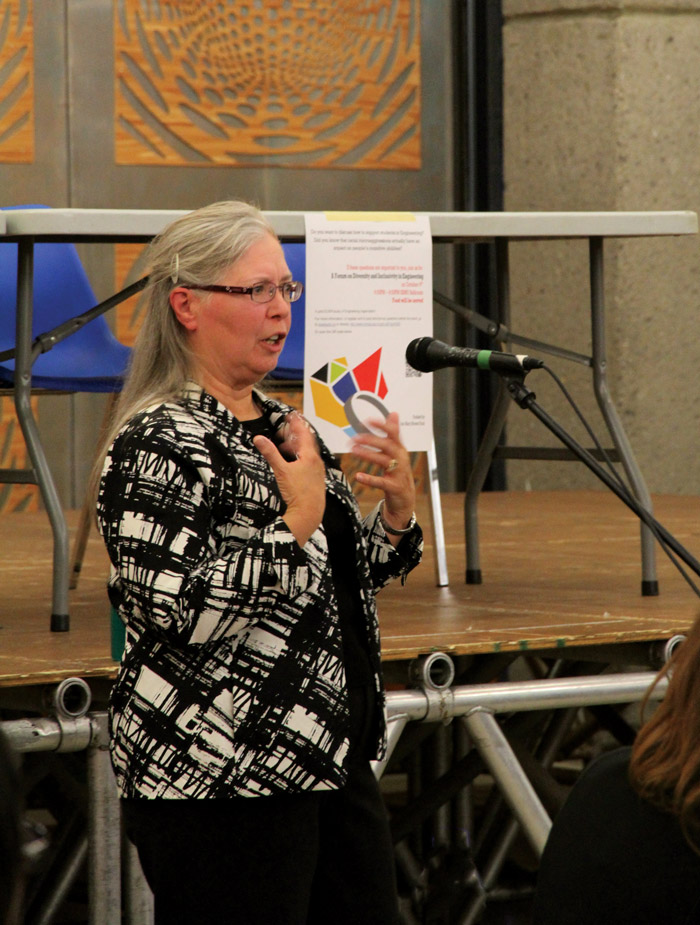Last Thursday, the Engineering Undergraduate Society (EUS) and the Faculty of Engineering hosted a forum about diversity and inclusivity in the field. According to the faculty’s website, the forum aimed to allow members of the engineering community to discuss their experiences with the challenges they faced regarding diversity and inclusivity, as well as possible solutions.
McGill’s enrolment report for Fall 2013 states that the Faculty of Engineering had an undergraduate student enrolment ratio of 24.9 per cent female students to 75.1 per cent male students. However, female students constituted a majority 56 per cent of the entire undergraduate student body for Fall 2013 term.
Keynote speaker Dr. Karen Tonso of Wayne State University explained how societal interactions could create a sexist culture that ignored women’s contributions to the field and discouraged women from joining in the first place.
“Female scientists continue to face discrimination, unequal pay, and funding disparities, and these disparities increase […] relative to rank,” she said. “Engineering has a sexist culture [….] It’s built up via social interactions, through ‘guy talk’ […] through jokes and language that degrade women. It’s built up through women being thought of as technically incompetent sexual beings.”
Tonso continued her speech by explaining the importance of diversity.
“Engineering creates and produces the technologies of everyday life,” she said. “Without the participation of members of diverse communities, engineers run the risk of losing sight of the world and their role in it, and this affects their technological creations.”
The keynote speech was followed by a panel discussion. Tal Arbel, professor at the department of electrical and computer engineering, spoke about the apparent discrepancy between the provincial government’s investment in engineering—a $1.5 million investment over three years for development of technology start-ups was announced in the 2014-2015 provincial budget—and women’s involvement in the field. Only 13 per cent of the members of the Ordre des ingénieurs du Québec, a provincial organization of engineers, are female.
“There’s a lot of opportunity for employment [in] fields ranging from aerospace to digital arts,” Arbel said. “All the parts are in place, so you’d think that a balanced proportion of the native population would feel encouraged and excited to participate in these new opportunities [….] Surprisingly that is not the case [….] By permitting half of the population to opt out, Quebec is losing its chance to emerge as a leader on the global stage in various sectors of engineering.”
Arbel also spoke to the importance of female mentorship for students.
“Once you’re in the program […] and all your colleagues are male and teachers are male, certainly that will make you question your belonging and feel isolated,” she said. “I do think that having female professors not only affects the way female students feel, but it also affects the way everybody else feels [….] I also think that female professors bring a new perspective to teaching.”
Sara Houshmand, a 3rd year PhD counselling psychology student and a member of the panel, highlighted the effects of the gender-race intersection on students from a psychological perspective.
“[When] we tend to segregate race from gender from disability, we miss the intersection of identities [….] These different ‘isms,’ these difference aggressions coexist and they’re not additive, they take on a whole new face on their own,” Houshmand said. “Mental health-wise, racial microaggressions are associated with depression […] feelings of exclusion, and hopelessness [….] Physiologically, racism has generally been attributed to chronic stress, and tends to have the same impact as chronic stress.”
Tanja Beck, access services advisor for the Office of Students with Disabilities, spoke on how the intersection of social identities could be used to address bias.
“One of the most important points when it comes to preventing biases and stereotypes is that you know your own social location,” she said. “You know which privileges you have and [which] you don’t have […] because we all have learned biases, from our parents, from schools, from peers […] we have to reflect everyday on our biases; it’s a very self-referential exercise.”
Houshmand added that creating a dialogue regarding the challenges faced by marginalized groups was essential.
“The only thing we can do is help to disseminate this knowledge,” Houshman said. “Sometimes there’s the making things mandatory, but unfortunately, it’s not just something you can shove down someone’s throat [….] I think that the leadership can take [a] stance and can speak to why it’s important and encourage people to go to these kind of things.” Houshmand said.
Robert Forestell, U3 Mechanical Engineering and president of the EUS, discussed the challenges of raising awareness.
“It’s very effective in terms of sharing ideas and strengthening our views and getting on the same platform, but the bottleneck is to actually implement them,” Forestell said. “It’s one thing to tell our faculty top-down ‘this is what inclusivity means,’ but it’s really a whole other thing to have students recognize that about themselves. One of the goals of this forum is to see how we can all get there as a community.”








